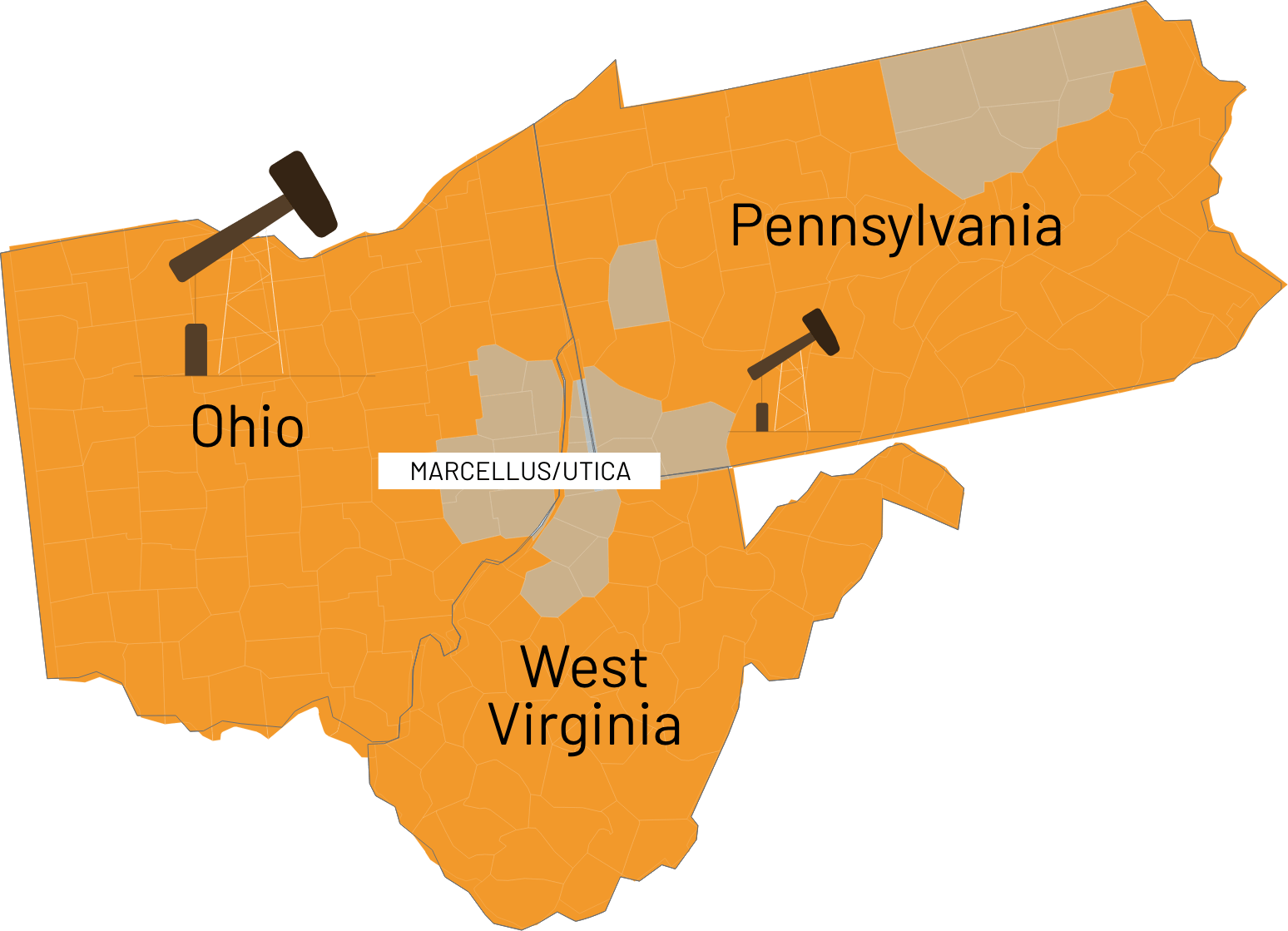There are lots of people who don’t understand the mineral interest they own until companies start setting up to drill oil and gas on their property. If you’re a prospective buyer, you need to get proper information about how these mineral rights work before you end up at people’s mercies.

Mineral Rights Ohio has a history that dates back to the 1800s. The first ever commercial production of oil took place in 1860 in Washington County. They later discovered natural gas in 1884 and have been making progress over the production of oil and gas ever since.
The mineral rights Ohio are usually sold differently from the surface rights of any property. The cost of mineral rights in the state used to be around $10 to $15/acre or for one-eighth royalties but since extractors started locking up mineral rights, the cost of mineral rights has gone up to several thousand dollars per acre making mineral rights more lucrative to engage.
Mineral rights Ohio are normally sold separately from the land where the mineral reside. These rights give holders access to claim the mineral interests on their land. If you own mineral interest on a property, you may have title to them, but if the previous owners have sold or leased these oil and gas rights, you may not be able to sell them.
With these oil and gas rights, owners have access to the minerals in the ground for exploration and production. Nevertheless, mineral rights may be revoked and penalties imposed if mineral owners violate the surface damage agreement specifying what types of activities are permitted by the surface owner.
In addition to leasing and selling mineral rights, holders can bequeath their interest to the next generation as gifts, so that they will continue to exist independently of changes in ownership of the attached property.
According to an Ohio Supreme Court ruling on a land matter which questioned if oil and gas rights do expire due to lack of production? The court ruled that it’s a use-it-or-lose-it proposition. The Ohio Dormant Mineral Act DMA specifies that if you own mineral rights over someone else’s land, you have 20 years to perform your exploration and production of oil and gas and other mineral or the rights revert to the landowner according to Ohio Supreme court.
Surface rights are the rights that grant surface owners rights to the surface area of a property. This surface area includes any farm, garage or surrounding land in a property. The rights to minerals in the subsurface are not included so except you own both rights, you have no access to what’s underground. Which makes it fantastic for surface rights and mineral rights to coexist in the same property.
However, there would be a conflict between surface and mineral rights holders when either trespass on the contract of their various rights agreement. If no one trespasses, both holders can conduct their business on a property simultaneously.
There could also be a conflict if a mineral rights holder exercises their rights to the mineral underground but causes damage to the surface of a property when extracting their mineral interests. This can lead to conflict especially when the mineral rights holder refuses to fix the damage.
To find the ownership of mineral rights in Ohio is not a difficult activity. It’s quite easy as ownership of mineral rights are recorded in any of the 88 county recorder offices in Ohio. Whether the mineral rights still belong to the owner, have been sold by the owner to someone else, or have been leased by the owner to someone else, the ownership records will be maintained by a county recorder.
To find out who own mineral rights in Ohio:
Determine the property owner’s name and address of the property.
You can visit the right county auditor’s office online or in-person with the above information to verify the ownership of the property before you begin your research at the county’s recorder office.
If there’s no record of the property ownership online, you will need to visit the office in person and request a copy of the deed of the property. This deed should provide you with all the necessary information regarding the severed mineral and other solid minerals.
According to Ohio’s Dormant Mineral Act DMA, a landowner can repossess the title to their severed mineral interests if the rights holder does not explore or produce the oil and gas within 20 years. This DMA guides Ohio County members in their ownership of mineral rights.
However, several steps need to be taken to claim mineral rights in Ohio, they include;
After confirming your ownership with a lawyer, you should draw up a deed of transfer of the dormant mineral in your name and file it with your local county records office as the new mineral owner according to the state laws.
County offices handle the land transaction, lease transaction, royalty compliance and dormant mineral transfer. They are the only ones who can perform these services.
In addition to processing your royalties, the county office would also assist you in transferring rights to royalty payments to you.
When people inherit properties that have not been severed, they inherit the surface rights along with anything in the ground. In the event of a loved one’s death, here’s what follows;
Whatever property left behind will be given to you and if those properties have mineral rights, you will receive those mineral rights in a situation that the property was willed to you.
If you’re to inherit any property with mineral rights, the property would be left with someone to manage. To determine whether your deceased loved one had the right to convey the property, an attorney or title company must conduct a title search at a county recorder office.
In cases where mineral rights are distinct from the real estate’s surface, an attorney will prepare a deed that describes all mineral rights for you.
If there’s a current lease on the mineral rights that means the previous landowners agreed with a third party that allowed them to extract resources in exchange for financial compensation. In this case, the executor would have to transfer the interest into your name so you can collect your compensation.
Oil and Gas rights in Ohio are valued based on the production of a well. They come with tax liability just like every other asset. The tax associated with mineral royalties is the Ad Valorem tax which is placed on the producing wells of mineral and Royalty owners. These taxes are billed and collected once every year according to the law.

Many landowners wonder about the value of mineral rights. If you’re one of those mineral rights owners, you can get information regarding the cost of the minerals beneath your property per acre.
To know the value of your mineral rights, it is important to know if your property is producing or non-producing. If you bought the property or you inherited it, you should know if your property is producing or non-producing by checking if the previous owners were receiving royalty checks.
With these royalties, you can deduce the value of your mineral rights without any calculations. However, if your property is non-producing then the value of the mineral rights is harder to determine because you do not receive any royalty checks every month.
Your non-producing royalties could be as low as $250 or more per acre or a few hundred depending on the position of your property in Ohio.

For those not familiar with mineral rights, royalties, ownership structures, and laws, it can be confusing. You may not know what to do if you want to purchase mineral rights. But with help of a specialist, you can get an accurate calculation of the mineral value and the worth of mineral rights in the county.
At Pheasant Energy, we are dedicated to providing a smooth experience for everyone who wants to buy mineral rights or oil and gas royalties and provide them with expert advice. We’re a reliable broker to partner with in business.

If you want to sell mineral rights in Louisiana, it is also not a hard process. However, the sale may not be immediate, given that the property has to undergo analysis and surveillance before it is certified okay for sale, and you are ready to sign the contract.
Selling your mineral rights in Ohio is a decision that’s left to the owner because there are many reasons why people may want to sell their investments. If you decide to sell your mineral rights, you can get a sales specialist who would help you facilitate the sale. The decision is yours.
Before the rights are sold, the sales specialist would evaluate the mineral rights value of your property before you can put it up for sale. Pheasant Energy can act as a reliable broker who can broker a correct deal that will favour all parties.
Transferring mineral rights to your name in Ohio is not a hard task. However, the property which you claimed was transferred to you must be in the name of your family or whoever you claimed to own it priorly. Before any process is continued, there will be a confirmation process.
Once an attorney confirms the ownership of the property and establishes that the said property should be transferred to you, a transfer deed would be prepared so the mineral rights can be officially registered in your name as the new owner.
Once the deed is recorded, all payments and royalties linked to those mineral rights would be channelled to the new owner and they shall start receiving dividends as soon as companies start drilling on the property.

Currently, Pheasant Energy operates in:
These counties are part of the Marcellus/Utica Basin.
75+
1000+
100K+
Simple Steps
Give us a call at (817) 251-8282 or use our form in order to take the first step towards getting your offer.